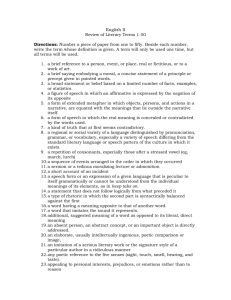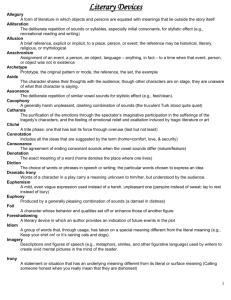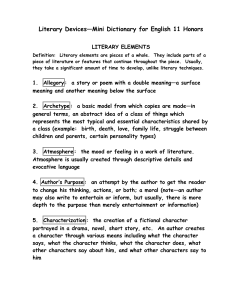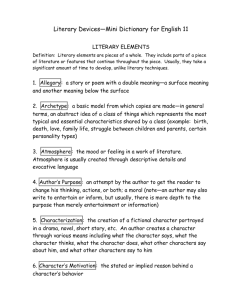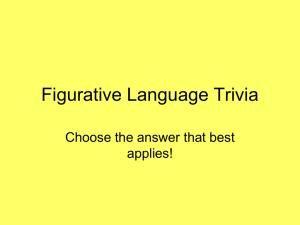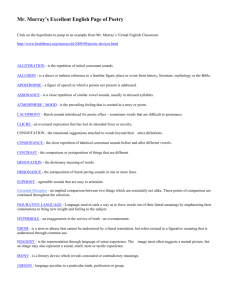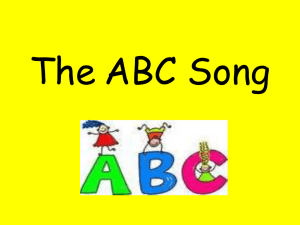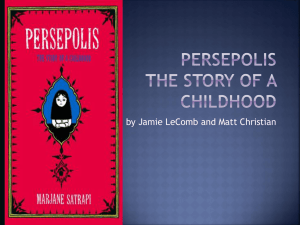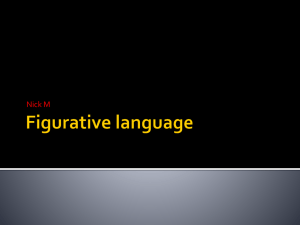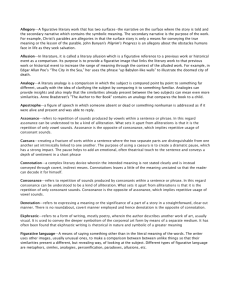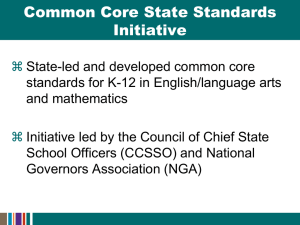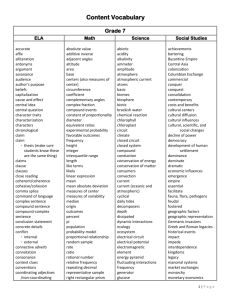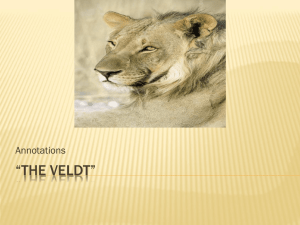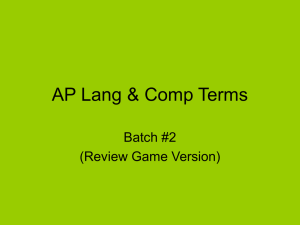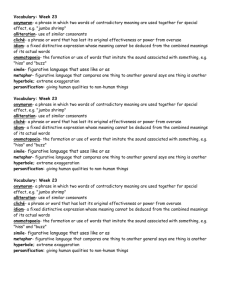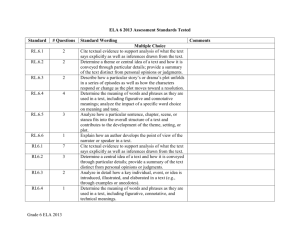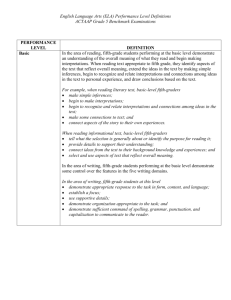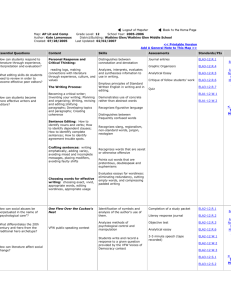Grade 9 ELA Literary Terms
advertisement
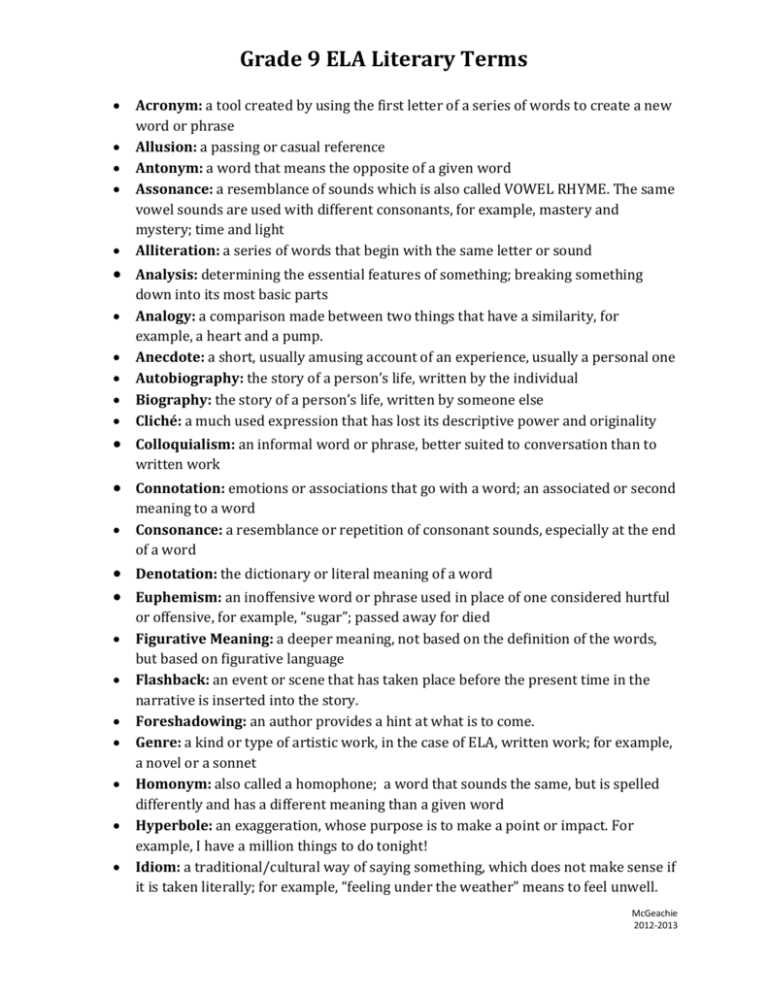
Grade 9 ELA Literary Terms Acronym: a tool created by using the first letter of a series of words to create a new word or phrase Allusion: a passing or casual reference Antonym: a word that means the opposite of a given word Assonance: a resemblance of sounds which is also called VOWEL RHYME. The same vowel sounds are used with different consonants, for example, mastery and mystery; time and light Alliteration: a series of words that begin with the same letter or sound Analysis: determining the essential features of something; breaking something down into its most basic parts Analogy: a comparison made between two things that have a similarity, for example, a heart and a pump. Anecdote: a short, usually amusing account of an experience, usually a personal one Autobiography: the story of a person’s life, written by the individual Biography: the story of a person’s life, written by someone else Cliché: a much used expression that has lost its descriptive power and originality Colloquialism: an informal word or phrase, better suited to conversation than to written work Connotation: emotions or associations that go with a word; an associated or second meaning to a word Consonance: a resemblance or repetition of consonant sounds, especially at the end of a word Denotation: the dictionary or literal meaning of a word Euphemism: an inoffensive word or phrase used in place of one considered hurtful or offensive, for example, “sugar”; passed away for died Figurative Meaning: a deeper meaning, not based on the definition of the words, but based on figurative language Flashback: an event or scene that has taken place before the present time in the narrative is inserted into the story. Foreshadowing: an author provides a hint at what is to come. Genre: a kind or type of artistic work, in the case of ELA, written work; for example, a novel or a sonnet Homonym: also called a homophone; a word that sounds the same, but is spelled differently and has a different meaning than a given word Hyperbole: an exaggeration, whose purpose is to make a point or impact. For example, I have a million things to do tonight! Idiom: a traditional/cultural way of saying something, which does not make sense if it is taken literally; for example, “feeling under the weather” means to feel unwell. McGeachie 2012-2013 Grade 9 ELA Literary Terms Illustration: a the use of language to make a point or create a mental picture; may also be an actual picture to accompany text! Imagery: creating a mental image/picture using figurative language In context: based on how a word/phrase is used within a piece of writing, for example, the definition of a word in context refers to the meaning of the word, based on how it is used in the passage Inference: the process of reaching a conclusion from given information; a deduction or implication Informational Text: writing whose purpose is to provide background or information on a specific topic Irony: humorous or mildly sarcastic use of words to imply the opposite of what they normally (or literally) mean. Jargon: a special language belonging exclusively to a group, which others outside the group cannot understand Literal Meaning: meaning based on the actual definition of the words Metaphor: a comparison that does not use “like” or “as”, but suggests that something “IS” something else Metonymy: a figure of speech where the name of one thing is used in place of another which is suggested by or associated with it, for example, the bottle = strong drink; Kremlin = Russian government Mythology: a set of stories, traditions or beliefs connected to a specific group; are often used to explain basic aspects of existence (what causes seasons, how mountains were created, etc); Greek myths are commonly known Narrative Text: writing that tells a story Narrator/Speaker: the person who is telling the story Non-fiction: writing whose topic is true or real Onomatopoeia: the formation of a word whose sound imitates the noise or action it is describing, for example, hiss, buzz, or bang. Oxymoron: the use of two contradictory words are used together for effect, for example, “Poor little rich girl” Paradox: a statement that seems contradictory or absurd, but is actually true or valid, for example, you have to be cruel to be kind; I am lying (if we take that as true, then the statement is false!) Personification: giving human characteristics to non-humans Prose: straight forward or direct speech/language; commonplace; matter of fact Pun: a play on words that relies on a word having more than one meaning Simile: a comparison of two things using “like” or “as” McGeachie 2012-2013 Grade 9 ELA Literary Terms Symbolism: an object, person, idea, etc., used in a literary work to stand for or suggest something else with which it is associated (overtly, or in a more subtle way). Synecdoche: a part is substituted for the whole, or the whole is used for the part, for example, 50 HEAD of cattle = 50 cows; the ARMY = a soldier Synonym: a word that means the same as a given Understatement: representing something as less than it is, for example, Steve Jobs made a bit of money with Apple. McGeachie 2012-2013
